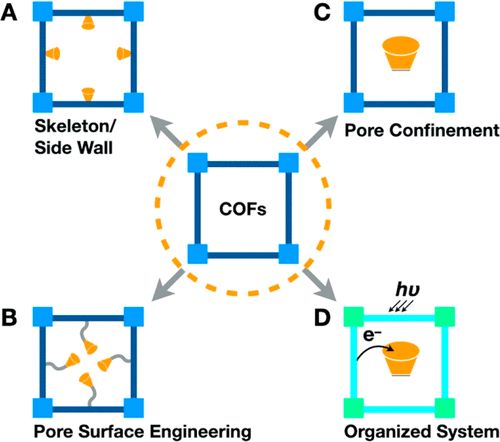CD Biosynsis is a leading research organization in the field of enzyme design and evolution, with long and in-depth experience in directed enzyme evolution. Our professional research team provides highly-quality services to help researchers improve enzyme-substrate reactivity and provide valuable insights for the rational design of enzymes with better properties or new functions.
Overview
Enhancing covalent enzyme-substrate binding is an important project of enzyme engineering, especially when aiming to improve catalytic efficiency, substrate specificity, or overall enzyme performance. Covalent interactions between enzymes and substrates play a crucial role in catalysis process, so optimizing these interactions can lead to more effective and specific enzymatic reactions.
 Fig 1. Covalent Organic Frameworks (COFs) can be developed using different chemistries to construct a diversity of heterogeneous catalysts. (Guo J, et al., 2020)
Fig 1. Covalent Organic Frameworks (COFs) can be developed using different chemistries to construct a diversity of heterogeneous catalysts. (Guo J, et al., 2020)
Our Services
Based on our advantages in the field of computer-aided design and AI applications, the EnzymoGenius™ platform aims to provide enzyme designing services to improve covalent enzyme-substrate binding.

- Site-Directed Mutagenesis
To enhance the binding between enzyme and substrate, we will target specific amino acid residues involved in substrate binding and catalysis. Subsequently, rational design through targeted mutagenesis can introduce amino acid substitutions to improve covalent interactions.
- Design Substrate Analogs
Design substrate analogs that mimic the actual substrate structure, as substrate analogs help identify key binding interactions, which can guide modifications to enhance binding affinity.
- Cofactor Optimization
Some enzymes require cofactors for optimal activity, so the type and concentration of cofactors should also be optimized to enhance substrate binding when needed.
- Transition States Stabilization
Design of enzyme variants or use of small molecules that stabilize the transition state of the enzyme reaction, thereby increasing the stability of the transition state of enzyme-substrate binding.
- Cooperative Binding Effects
Investigate the possibility of cooperative binding effects, where binding of one substrate molecule facilitates the binding of additional molecules.
- Multivalent Interactions
Introduce multivalent interactions by modifying the enzyme or substrate to contain multiple binding sites.
What We Can Offer
- Professional Research Team
We have a professional research team of scientists with decades of experience in the field of enzyme design and evolution, focusing on the directed evolution and rational design of enzymes, and are committed to providing the greatest impetus for enzyme biology research.
- High-quality Services
We have a team of highly skilled and experienced scientists with in-depth knowledge of enzyme design evolution, who can provide you with professional consulting services before the project and reliable support services after the sale.
CD Biosynsis strives to enhance covalent enzyme-substrate binding for various applications, whether academic research, industrial applications, or biotechnological development, our services are tailored to meet your specific requirements. Our team is ready to assist you and provide the insights you need to achieve your goals. If you are interested in our services, please don’t hesitate to contact us.
Reference
- Guo, J.; Jiang, D. Covalent organic frameworks for heterogeneous catalysis: principle, current status, and challenges. ACS Central Science. 2020, 6(6): 869-879.

































 Fig 1. Covalent Organic Frameworks (COFs) can be developed using different chemistries to construct a diversity of heterogeneous catalysts. (Guo J, et al., 2020)
Fig 1. Covalent Organic Frameworks (COFs) can be developed using different chemistries to construct a diversity of heterogeneous catalysts. (Guo J, et al., 2020)